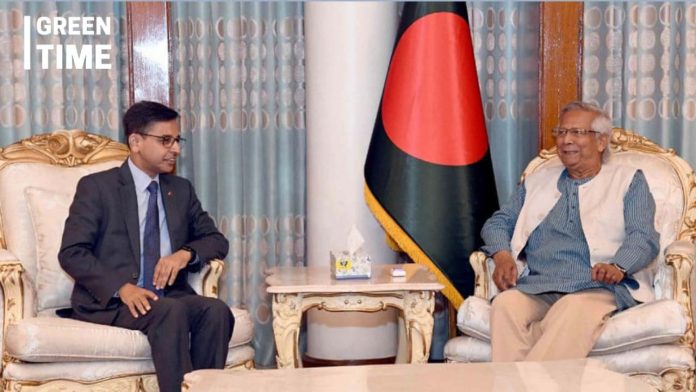During a courtesy meeting with Indian High Commissioner to Bangladesh Pranay Verma at the state guesthouse Jamuna, Chief Adviser Professor Muhammad Yunus proposed the creation of a high-level mechanism between Bangladesh and India to jointly manage emergency situations such as floods. The meeting, held on Thursday, focused on enhancing bilateral cooperation, particularly in addressing water-related challenges that both countries face.
Professor Yunus, emphasizing the importance of collaboration on water issues, highlighted the potential benefits of a cooperative approach to flood management. He suggested that both nations could activate a high-level response mechanism during emergencies, similar to the flag meetings regularly held between Border Guard Bangladesh (BGB) and India’s Border Security Forces (BSF). This proactive stance could prevent the severe impacts of natural disasters and ensure the safety and well-being of people on both sides of the border.
The discussion also touched upon the recent floods in Tripura, which High Commissioner Verma described as “very unprecedented,” displacing 50,000 people and causing significant disruption in both Bangladesh and India. According to Verma, the floods were exacerbated by the automatic release of water due to rising water levels, creating havoc in the region. Professor Yunus pointed out that issues like these could be more effectively managed through shared water management strategies, citing the Indus Waters Treaty between India and Pakistan as a model for such cooperation.
Beyond flood management, the meeting also addressed broader regional concerns, including minority rights and regional cooperation. Professor Yunus reassured that reports of attacks on minorities in Bangladesh have been “exaggerated” and extended an invitation to Indian journalists to visit Bangladesh to report on the issue firsthand. He reiterated Bangladesh’s commitment to safeguarding all citizens, including minorities, a message he also conveyed to Indian Prime Minister Narendra Modi during a recent telephone conversation.
The Chief Adviser further emphasized the importance of regional organizations like BIMSTEC and SAARC, particularly in fostering unity among the youth of South Asia. He expressed his vision of a “world of three zeros”—zero poverty, zero unemployment, and zero net carbon emissions—and discussed his longstanding ties with India, where the Yunus Center operates in 18 universities.
High Commissioner Verma affirmed India’s commitment to working with Bangladesh to achieve shared aspirations for peace, security, and development. Both leaders exchanged views on various issues of mutual interest, underlining the importance of strengthening people-to-people ties between the two nations.
This meeting signifies the ongoing efforts to enhance Bangladesh-India relations, focusing on collaborative approaches to shared challenges and a mutual commitment to regional stability and prosperity.

